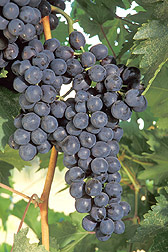This page has been archived and is being provided for reference purposes only. The page is no longer being updated, and therefore, links on the page may be invalid.
|
|
|
|
The Goal: Finding--and Using--Key Grape Genes
By Ann PerryApril 16, 2008
The Agricultural Research Service (ARS) works closely with the National Grape and Wine Initiative, a nationwide coalition representing all segments of the grape industry, to support grape producers nationwide. As part of this support, ARS scientists are embarking on a study to index the useful genetic variation of more than 2,000 accessions in the ARS grape germplasm collection.
ARS plant geneticist Ed Buckler works at the agency's Robert W. Holley Center for Agriculture and Health (RWHC), formerly the U.S. Plant, Soil and Nutrition Laboratory in Ithaca, N.Y. He will collaborate with other scientists to genetically characterize many of the Vitis accessions held in ARS germplasm collections. ARS is the U.S. Department of Agriculture's chief scientific research agency.
Buckler’s research team will locate thousands of single nucleotide polymorphisms (SNPs) throughout the grape accessions to create a functional SNP index to thousands of functional variants in the grape genome. SNPs are DNA sequence variations that occur when a single nucleotide in the genome sequence is altered. Such genomic variations may hold the key for controlling variation in traits for enhancing grape quality, such as disease resistance or better berry color.
RWHC computational biologist Doreen Ware will conduct quality-control analysis of the grape genomic data. She will use the genomic data and an estimated 350,000 available grape expressed sequence tags—short snippets of DNA—to find likely SNPs for further study. This will enable grape geneticists to start connecting molecular diversity with trait variation.
Other ARS scientists involved in this project include plant physiologist Leon Kochian, also at RWHC, and plant geneticists Chuck Simon and Gan-Yuan Zhong. Simon is with the ARS Plant Genetic Resources Unit and Zhong is with the ARS Grape Genetics Research Unit, both located in Geneva, N.Y.
Simon will complement the efforts of this research initiative by expanding and coordinating the evaluation of the grape germplasm collection for horticulturally important traits. Zhong will use the results of the research to assist grape breeders and producers in creating more robust and appealing grape varieties.


